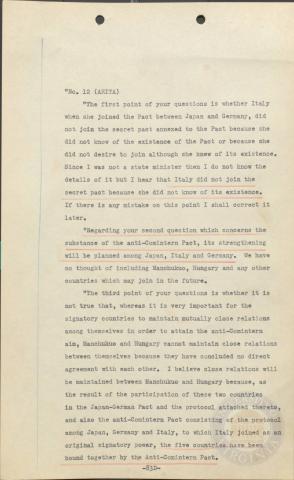
Page 83D
| Parent | Collaboration Between Japan, Germany and Italy - Volume II |
|---|---|
| Date | 25 November 1941 |
| Language | English |
| Collection | Tavenner Papers & IMTFE Official Records |
| Box | Box 15 |
| Folder | Japan, Germany, Italy Collaboration Vol 2 |
| Repository | University of Virginia Law Library |
"No. 12 (ARITA)
"The first point of your questions is whether Italy when she joined the Pact between Japan and Germany, did not join the secret pact annexed to the Pact because she did not know of the existence of the Pact or because she did not desire to join although she knew of its existence. Since I was not a state minister then I do not know the details of it but I hear that Italy did not join the secret pact because she did not know of its existence. If there is any mistake on this point I shall correct it later.
"Regarding your second question which concerns the substance of the anti-Comintern Pact, its strengthening will be planned among Japan, Italy and Germany. We have no thought of including Manchukuo, Hungary and any other countries which may join in the future.
"The third point of your questions is whether it is not true that, whereas it is very important for the signatory countries to maintain mutually close relations among themselves in order to attain the anti-Comintern aim, Manchukuo and Hungary cannot maintain close relations between themselves because they have concluded no direct agreement with each other. I believe close relations will be maintained between Manchukuo and Hungary because, as the result of the participation of these two countries in the Japan-German Pact and the protocol attached thereto, and also the anti-Comintern Pact consisting of the protocol among Japan, Germany and Italy, to which Italy joined as an original signatory power, the five countries have been bound together by the Anti-Comintern Pact.
